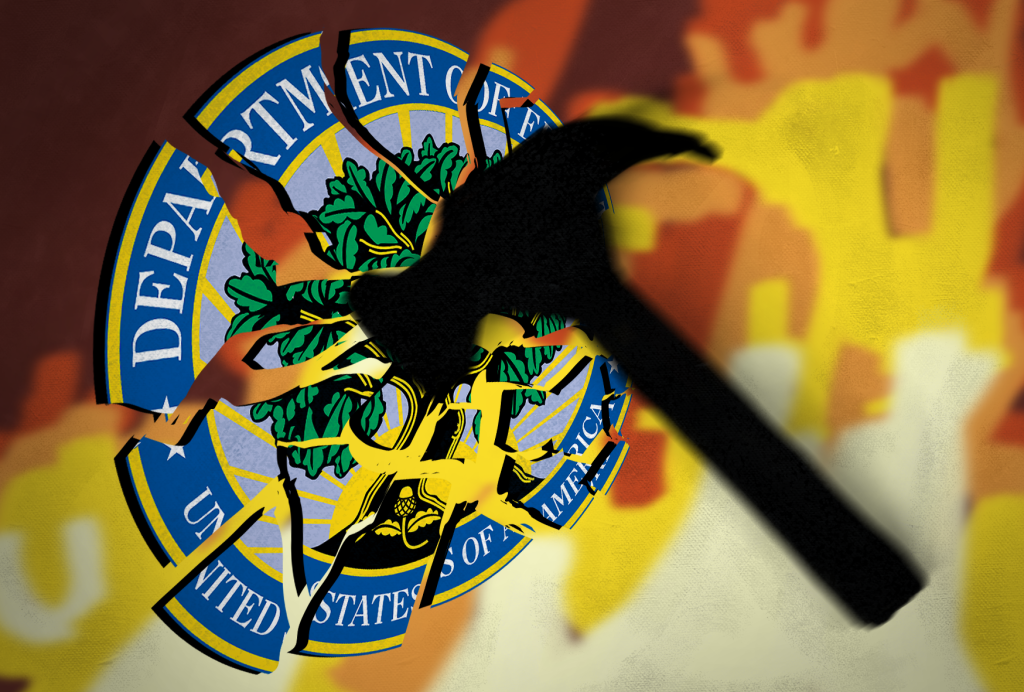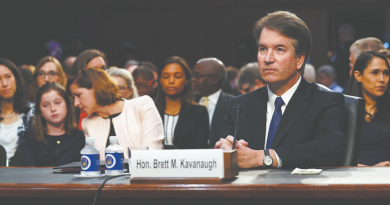What Trump’s policies could mean for the Department of Education
Between the nomination for Secretary of Education and the bill introduced to Congress, the future of the Department of Education is a pressing question.
By Michaela Ely
Over the last year, I have seen Donald Trump and the Republican Party repeatedly go after the Department of Education, something I thought I wouldn’t see again after the 2020 election. But I guess we’re back.
Dismantling the Department of Education has been a goal of the Republican party since the Reagan administration in 1981. Although President Reagan eventually backed down from dissolving the Department of Education in 1985, it was a policy goal that stuck around. The thought behind getting rid of the Department of Education is that anything education related will go to the states instead.
The Republican Party has long held the belief that the Department of Education is a bureaucratic organization that doesn’t benefit students in the long run.
Republican Senator Mike Rounds introduced a bill to Congress in the second session of the 118th Congress. He refers to this bill as the “Returning Education to Our States Act.’’ The bill would result in the redistribution of programs under the Department of Education to other government agencies. This comes after the Senate and House of Representatives gained a Republican majority after the Nov. 5 election. Between the bill, the Republican majority in Congress and Trump’s nomination for Secretary of Education, Linda McMahon, I don’t exactly have a lot of hope for the department as a student who is obtaining a degree in the field.
There are several federal programs that will be shifted to other departments if the Department of Education is dissolved.
The Department of Education oversees disbursement of Title I funds that go to schools with high percentages of low-income students, the administration of federal student loans for higher education, the protection of students’ rights and protection for students with disabilities. They also oversee Title IX which prohibits sex discrimination in schools at a federal level. This includes transgender students as well.
However, the department has little to no control over the actual schools in states and doesn’t make any curriculum decisions. This directly counters an idea that Trump presented at the Conservative Political Action Conference in 2022.
“Across the country, we need to implement strict prohibitions on teaching inappropriate racial, sexual and political material to America’s schoolchildren in any form whatsoever. And if federal bureaucrats are going to push this radicalism, we should abolish the Department of Education,” Trump said.
As a hopeful future educator, this comment is a slap in the face. With the rise of book bans, occurring especially in Republican states, it’s easy to see what kind of material Trump doesn’t want to be taught in school.
Since 2021, most of the books that have been banned feature LGBTQ+ characters, characters of color or contain depictions of sex, according to PEN America. While I believe that explicit depictions of sex are not necessarily age appropriate, some books that have been banned for this content include depictions of mental health struggles and sexual violence. This content may not be appropriate, but I think it can teach a valuable lesson to the reader and maybe make some teenagers feel less alone.
McMahon, a cofounder of World Wrestling Entertainment Inc. (WWE), and former administrator of the Small Business Administration from 2017 to 2019, is Trump’s nomination for Secretary of Education. McMahon doesn’t have any experience with education aside from her schooling and was named in a lawsuit for turning a blind eye to child sexual abuse, though the lawsuit is currently on pause, according to The New York Times.
While McMahon hasn’t yet outlined her vision for the department, I feel like it can be summed up largely by the statement made by Trump when he announced her nomination. In this statement, he said she would spearhead an effort to send education back to the states, which aligns with the administration’s goal to dissolve the department.
“Linda McMahon is just like Trump’s history of cabinet members. Anyone he can choose is going to be ill suited to do the job. She has no history, no knowledge base and I again don’t think that her role is to serve the public, serve our students. I see her as an individual that will be able to destroy the Department of Education,” Chief Leschi Schools teacher Heather Miller told The Ledger.
Chief Leschi Schools and many schools in the Tacoma and Puyallup School Districts are Title I schools and would likely be directly impacted by the closure of the Department of Education. Title I funding isn’t directly mentioned in the wording of the bill and it seems to be replaced with a section focusing on a block grant program to support elementary and secondary education under the Department of Treasury. This program would provide money directly to the states for education, but it isn’t labeled for anything specific other than just supporting schools.
Trump has previously stated that he wants to implement a “merit pay” system for teachers that would reward them based off of student success, however, organizations like the American Federation of Teachers have criticized it as there is little proof that merit pay leads to higher rates of student success.
This would mean that states can decide where to allocate funding, so it’s possible that Title I funding would no longer exist if the Department of Education were to be dissolved. It is also possible that the department wouldn’t be dissolved, as a filibuster proof majority of 60 votes would be necessary, but it’s possible that instead Trump and his administration would focus on rolling back equity and inclusion initiatives.
While Trump has attempted to distance himself from the Project 2025 agenda, several of his policies have aligned with it thus far, including getting rid of the Department of Education. Trump has stated that he has never read the nearly 1000 page document, but his policy proposals and nominations suggest otherwise. Several of the authors and contributors are former Trump aides and staff, who are now being tapped for roles within the administration, such as Russell Vought who was appointed to run the Office of Management and Budget.
Whether it be an active choice to dismantle the public education system as it currently stands, we should all be paying attention to what comes next.






